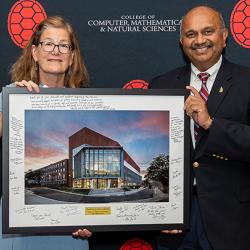Two Science Terps Honored as University Medal Finalists
Science Terps Njikem Jayda Fomengia and Jack Yang were named University Medal Finalists at the University of Maryland's May 2024 Commencement Ceremony. The University Medal honors graduating seniors demonstrating academic distinction, outstanding character and extracurricular community impact.
As a Black student in predominantly white K-12 schools, Jayda Fomengia (B.S. '23, neuroscience) often felt invisible and voiceless.
That’s why throughout her time at the University of Maryland, she dedicated herself to uplifting those in marginalized communities—something she aims to continue as she pursues her dream of becoming a pediatric neurosurgeon.
“My passion for fighting for those who are unable to fight for themselves finds its purpose in the field of pediatrics,” said Fomengia, a Banneker/Key Scholar who earned a 4.0 GPA. “I find it remarkable how healing a child can heal a whole family.”
As a member of the Gemstone Program in the Honors College, she investigated ways to improve artificial intelligence models for detecting and diagnosing non-small cell lung cancer. In addition, she is a member of the Johns Hopkins Neuroscience Scholars Program, where she is a research intern for its Brain Health Program. Outside of class, she worked as a medical assistant at a local pediatric urgent care center, served in leadership roles for the Charles R. Drew Pre-Health Society and supported fellow UMD students through Lean on Me College Park, a peer-to-peer text line for those struggling with their mental health.
“Jayda is by far one of the most impressive students I have encountered in terms of both academic brilliance and commitment to public service,” said Psychology Lecturer Amanda Chicoli, who serves as research coordinator and course director for the neuroscience major.
Senior year of high school for Jack Yang (B.S. '24, biochemistry; B.S. '24, economics) was a tough one. After feeling pain in his leg on a ski trip, he discovered he had a benign tumor that required surgery. It took him months to be able to walk again, but the experience left more than a “gnarly scar” on his body—it sparked a desire to become a physician.
“I want to fight alongside patients, conduct medical research and induce systemic change, allowing all of us to live better, healthier lives,” said Yang, a Banneker/Key Scholarship recipient.
At UMD, he became the co-director of Kesem, which supports children who have a parent with cancer. He led the organization to win the 2023 Do Good Challenge and has now joined the Do Good Campus Fund’s student committee to empower others across campus to make a positive impact on the world.
In addition, he conducted research on heart muscle cell growth and blood cell production at the University of Maryland School of Medicine (UMSOM) and the National Institutes of Health, respectively, which could lead to better understanding of and treatments for heart and blood diseases.
“Jack reminds me of some of the best colleagues that I have had the privilege of working with,” said Michigan State Chair of Medicine Charles Hong, who oversaw Yang’s internship at the UMSOM, “someone whom I would want to have around when situation gets tough, and to whom I would not hesitate to refer my own family members to get the best medical care.”
Adapted from article written by Karen Shih







